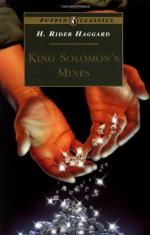After that I got a little fitful sleep, only to wake from time to time with a start, thinking that I was once more an actor in the terrible events of the last twenty-four hours. Now I seemed to see that warrior whom my hand had sent to his last account charging at me on the mountain-top; now I was once more in that glorious ring of Greys, which made its immortal stand against all Twala’s regiments upon the little mound; and now again I saw Twala’s plumed and gory head roll past my feet with gnashing teeth and glaring eye.
At last, somehow or other, the night passed away; but when dawn broke I found that my companions had slept no better than myself. Good, indeed, was in a high fever, and very soon afterwards began to grow light-headed, and also, to my alarm, to spit blood, the result, no doubt, of some internal injury, inflicted during the desperate efforts made by the Kukuana warrior on the previous day to force his big spear through the chain armour. Sir Henry, however, seemed pretty fresh, notwithstanding his wound on the face, which made eating difficult and laughter an impossibility, though he was so sore and stiff that he could scarcely stir.
About eight o’clock we had a visit from Infadoos, who appeared but little the worse—tough old warrior that he was—for his exertions in the battle, although he informed us that he had been up all night. He was delighted to see us, but much grieved at Good’s condition, and shook our hands cordially. I noticed, however, that he addressed Sir Henry with a kind of reverence, as though he were something more than man; and, indeed, as we afterwards found out, the great Englishman was looked on throughout Kukuanaland as a supernatural being. No man, the soldiers said, could have fought as he fought or, at the end of a day of such toil and bloodshed, could have slain Twala, who, in addition to being the king, was supposed to be the strongest warrior in the country, in single combat, shearing through his bull-neck at a stroke. Indeed, that stroke became proverbial in Kukuanaland, and any extraordinary blow or feat of strength was henceforth known as “Incubu’s blow.”
Infadoos told us also that all Twala’s regiments had submitted to Ignosi, and that like submissions were beginning to arrive from chiefs in the outlying country. Twala’s death at the hands of Sir Henry had put an end to all further chance of disturbance; for Scragga had been his only legitimate son, so there was no rival claimant to the throne left alive.
I remarked that Ignosi had swum to power through blood. The old chief shrugged his shoulders. “Yes,” he answered; “but the Kukuana people can only be kept cool by letting their blood flow sometimes. Many are killed, indeed, but the women are left, and others must soon grow up to take the places of the fallen. After this the land would be quiet for a while.”
Afterwards, in the course of the morning, we had a short visit from Ignosi, on whose brows the royal diadem was now bound. As I contemplated him advancing with kingly dignity, an obsequious guard following his steps, I could not help recalling to my mind the tall Zulu who had presented himself to us at Durban some few months back, asking to be taken into our service, and reflecting on the strange revolutions of the wheel of fortune.




